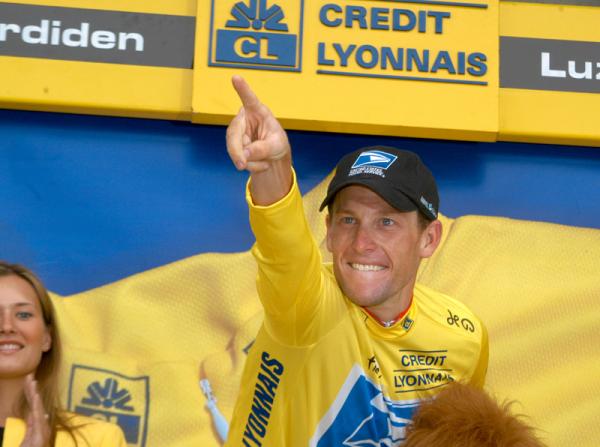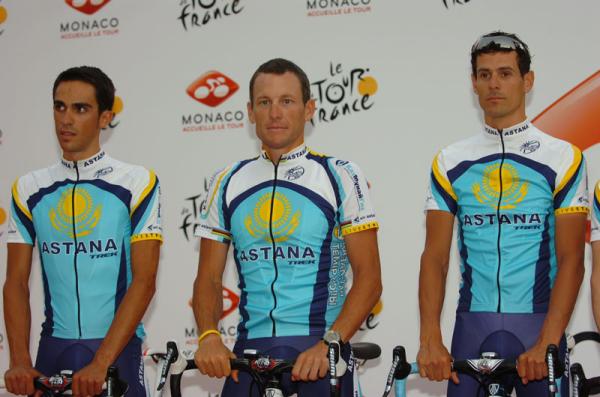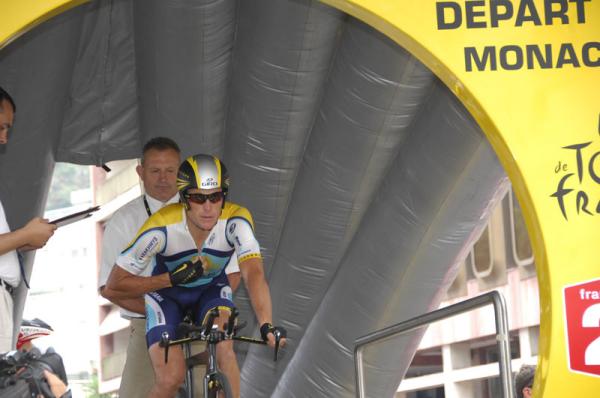The United States of Omerta
Sound of silence in wake of Armstrong case



Downtown Golden and the professional peloton has descended on the start of the sixth stage of the USA Pro Challenge. An American reporter working on the race snakes through a crowd of fans until he can find a rider he knows. He locks eyes on his target before the customary greetings are exchanged and the cameraman raises his equipment. The reporter asks if he can chat, on camera, about the stage route.
“And we’re rolling…. So tell me, what do you think of the news that Lance Armstrong has been sanctioned?”
On the other side of the street fans are putting the finishing touches to their homemade banners. Tom Danielson, resplendent in the KOM jersey steps from the safety of his team bus. “Go Tommy D”, one sign reads. “You’re the best George” reads another in blood red paint.
A few minutes later and the reporter strikes gold when he sees a RadioShack rider. The interviewee appears to thrive on the subject matter. He stands up for Armstrong, claims there’s no evidence, says that Armstrong has never failed a test, and all before he’s even taken a second question. In the background, more signs pop up. There’s one for Leipheimer, there’s one for Vande Velde, there’s one for Horner too. There’s even an anti-USADA banner.
In case you’ve been under a rock for the last week, seven-time Tour de France winner Lance Armstrong had been stripped of his titles by USADA, handed a lifetime ban, and assumed guilty by WADA’s president.
Within the space of a few days, a handful of press releases and a million or so tweets the sport had been irreparably affected. It remains to be seen whether real measures and safeguards will be made, whether accountability from those who let the sport become so corrupted will be served or whether Armstrong’s sanction will be stored away in cycling’s room 101 to gather dust with Festina and Operacion Puerto as examples of phoney reform.
The signs, the cheers and majority of ‘no-comments’ would, at first glance, suggest the latter as Armstrong – still clinging to his legacy – clouds the sport. Riders are told not to comment by their teams, and when they do they’re out of sync with each other, confused, scared and in some rare cases, deluded.
Get The Leadout Newsletter
The latest race content, interviews, features, reviews and expert buying guides, direct to your inbox!
The Omerta fog
Last week in an interview with Cyclingnews, Paul Kimmage wrestled with the idea that Omerta was still alive and kicking within the peloton. He made a strong case, pointing out that only Gustav Larrson had called Armstrong out for what he is.
David Walsh added weight to Kimmage’s beliefs. How many grand tour winners have come out and given their opinion on Armstrong? How many patrons who’ve sacrificed so much of their lives to reach the pinnacle of sport have taken the time to defend the sport and speak out? How many have even asked that a line is drawn in the sand?
"You can see Bradley Wiggins, our latest Tour winner,” Walsh tells Cyclingnews. “He’s never been questioning of Lance Armstrong. He’s been very anti-doping but if you read his book you would think he has a high regard for Armstrong when the evidence against him has been overwhelming. Bradley, open your eyes. Let’s hear what he has to say now. Bradley Wiggins is now the patron of the Tour de France, so what does he say about Lance today? Does he say it’s a great day for cycling that he’s been sanctioned or does he say he still admires Lance?"
However the core of the problem doesn’t lie at the feet of just the professional riders. It rests with the media, the governing bodies, the fans, cycling’s culture, and as we’ve seen with Phil Liggett’s cringe-worthy statements, sometimes it’s better to refrain from talking at all. Ever again.
Those who have spoken out, Floyd Landis, Tyler Hamilton, Jorg Jaschke, Bernhard Kohl – yes, they’ve all cheated but they’ve all admitted their guilt – yet the UCI has ostracised them and in the case of Landis and Kimmage, brought legal proceedings against them. Not exactly an endorsement for standing up for what’s right, is it?
“On my team, Argos-Shimano, I’m encouraged to speak out,” says Koen de Kort. “They tell us to be honest against doping and we’re allowed to say that if riders are positive they should be banned. Maybe our team is a bit different from other teams.
“But talking about Armstrong, he was one of the greats of the sport but now this has come out and I think it’s hard for all of us. My team haven’t said I can’t talk about it but maybe riders are scared but I don’t know.
“While it’s happened in the past but my career is now and I’m riding now. I’d like to support clean riding and while what happened to him happened a long time ago it’s not good for the sport. On the other hand it’s important that this doesn’t happen again. Now we should be looking at sanction riders harder, maybe even for life.”
Removing the mask
Having been a face of omerta during the early phase of his cycling career, Jonathan Vaughters neatly sums omerta up as an ideal: “it’s a sociological as opposed to an individual effort to misguide the truth.”
While fear and self-preservation are recognised elements of omerta, one value that’s uttered a little less is respect. It may not be a palatable sentiment, having respect for Armstrong, but it exists and needs recognising.
Vaughters says: “It depends who you’re talking to but of course there certainly is respect. At the end of the day, Armstrong was a talented athlete. While what USADA is doing now is certainly necessary, his group of peers from the Tour de France at the time, myself included…. Look of course I’ve admitted to doping but nowhere in my mind do I feel that I would have been a better bike rider if I’d doped more. There was no amount of doping that was going to get me to win a Tour so for that generation of athletes there’s certainly going to be people that hold a certain amount of respect for him.”
Jan Ullrich, who also doped during his career, feels the same. Escartin too, and almost an entire generation that followed or were pushed down the same path of doping.
Coincidently, David Millar, who works alongside WADA and has been vocal about his support for anti-doping, was asked to comment when the news broke regarding Armstrong. He refused to speak about the matter with Cyclingnews, later tweeting that he would pen his thoughts on Armstrong after USADA had made their evidence public.
"At one end of the spectrum you’ve got riders and team managers who are perpetuating omerta because they’re engaged in doping or have been in the past," says television commentator Gary Imlach.
"At the other end, I think there are ordinary riders who, like most people, just want a quiet life and to get on with the people they have to work with every day, so from that point of view you can sympathise to some extent with people not wanting to put their heads above the parapet.
"And I think from inside cycling they often perceive media coverage of doping as a sort of hostile act instead of something aimed at helping the sport so they develop a bit of a bunker mentality about it. So even perfectly clean riders who are above all suspicion are on the defensive the moment the subject is raised. And who knows whether that’s because they’re weak or afraid, or because they simply want to concentrate on riding their bikes without having to deal with unpleasant and uncomfortable issues.
"Having said that, there comes a point where you have a responsibility to speak out and very few riders have. Who knows, there might be more by way of a response if and when the full evidence against Armstrong ever gets a proper airing."
Sky’s Danny Pate has been vocal against doping on numerous occasions and although he cuts an unassuming figure, he is one of the most respected riders within the professional peloton. When Vinokourov won the Olympics, he said: “I don’t know how someone can serve a doping ban and then come back and come back and win the Olympics. That just cheapens it for me and doesn’t seem right. Cheating is always your decision so anyone on EPO now, I don’t think they should even come back.”
Asked what his thoughts were on Armstrong, and whether rider reactions were governed by fear and respect, he admitted; “There’s a lot of truth to all of those reasons. Lance has been the biggest face in cycling for a long time now. Either you really respect him, you hate him or you’re still really effected by him, The list goes on and on. Lance is different from other people. I don’t know if that’s the correct way but that’s how it’s happened.”
In 2010, Cyclingnews interviewed Rahsaan Bahati about his time with Floyd Landis. Bahati went on the record stating his personal support for Landis but within a matter of days he retracted his comments via Twitter and went out of his way to tell anyone that would listen that Cyclingnews had misquoted him.
Bahati’s backtracking was a decision based on fear, to save his ass and that of his fledgling team. Like Chris Horner and the rest of the peloton, it’s perhaps more important to understand ‘why’ they’re making the statements rather than what they’re saying.
“There’s only so many years that a rider can earn a living and because of that short life span and when you have something very controversial happen to one of the supposed icons of the sport a lot of riders are looking at their livelihoods being and because of that fear they also don’t want the general public to feel that the whole sport in invested in doping,” says Vaughters.
The sport has the opportunity to change, though. We’ve reached the second act and the characters of Filippo Simeoni and Christophe Bassons don’t exist within the modern sport because the culture has shifted. If a rider speaks up he isn’t chased, he isn’t spat on.
Despite Liggett’s recent comments, there are changes in the media too. In its post-Tour magazine in 1998, a British publication printed a subtext-free article called ‘Ullrich’s backroom boys’ with a double-page spread of the German athlete’s support staff. In their corresponding issue in 2006, they began a ‘clean campaign’. Similarly, more journalists are asking tougher questions. Some are having to backtrack on their previous set of ethics but the framework is shifting.
“The general consensus in the peloton today is that you’re an idiot if you’re even considering doping and the people that are ostracised now are the people that have an issue with doping. It’s a complete shift from what it was ten, fifteen years ago. If Bassons rode today he’d win three or four races a year and would be a very respected member of the peloton,” says Vaughters.
Ben Jacques-Maynes summed up the situation perfectly, tying together both cycling’s past and a love for cycling.
“This is the crux of when the new cycling really starts,” he said. “Everyone's been saying, year in year out, that this is the cleanest cycling's ever been. Well I think this is the first step. From this point, maybe it will start cleaning itself out. I don't think it's cleaned itself out yet. I think this is the first sign that however big your ambitions are, you're not too big to fail. People can go down, whatever you think of yourself.”
But perhaps the most important words come from Armstrong himself. In 1998, within weeks of Festina’s Tour, he wrote: “From what I can see the UCI has been absent and crawled under a rock since the whole business started. But as bad as all this was, I still think that cycling is very resilient.”
If the riders are going to be encouraged to speak out it’s up for rest of cycling, and the UCI to act. The sport’s governing body has remained under their rock for too long, allowing for a passive acceptance of omerta and silence to reign. It’s time for them to wake up, and it’s time for that reporter in Colorado to turn the camera around and ask himself the tough questions.
Daniel Benson was the Editor in Chief at Cyclingnews.com between 2008 and 2022. Based in the UK, he joined the Cyclingnews team in 2008 as the site's first UK-based Managing Editor. In that time, he reported on over a dozen editions of the Tour de France, several World Championships, the Tour Down Under, Spring Classics, and the London 2012 Olympic Games. With the help of the excellent editorial team, he ran the coverage on Cyclingnews and has interviewed leading figures in the sport including UCI Presidents and Tour de France winners.
